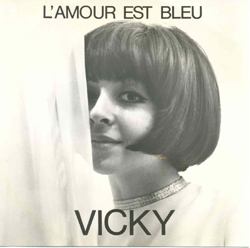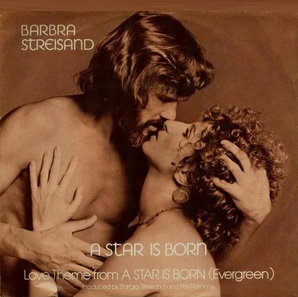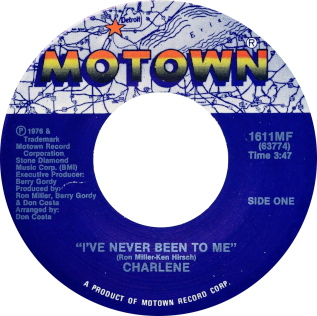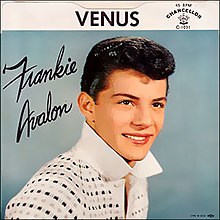The Adult Contemporary chart is published weekly by Billboard magazine and lists the most popular songs on adult contemporary radio stations in the United States. The chart is compiled based on airplay data submitted to Billboard by stations that are members of the Adult Contemporary radio panel. The chart debuted in Billboard magazine on July 17, 1961. Over the years, the chart has gone under a series of name changes, being called Easy Listening(1961–1962; 1965–1979), Middle-Road Singles(1962–1964), Pop-Standard Singles(1964–1965), Hot Adult Contemporary Tracks(1979–1982) and Adult Contemporary(1983–present) The current number-one song on the chart is "Flowers" by Miley Cyrus.

"December, 1963 " is a song originally performed by the Four Seasons, written by original Four Seasons keyboard player Bob Gaudio and his future wife Judy Parker, produced by Gaudio, and included on the group's album Who Loves You (1975).

"Ramblin' Rose" is a 1962 popular torch song written by brothers Noel Sherman (words) and Joe Sherman (music) and popularized by Nat King Cole. The recording by Nat King Cole reached No. 2 on the Billboard Hot 100 chart in 1962.

"You'll Never Find Another Love Like Mine" is a song written by Kenny Gamble and Leon Huff and performed by R&B singer Lou Rawls on his 1976 album All Things in Time. The song proved to be Rawls' breakthrough hit, reaching number 1 on both the R&B and Easy Listening charts as well as number 4 on the dance chart and number 2 on the US Billboard Hot 100. This was the first and only time that one of Rawls' records reached Billboard's pop Top Ten.

"L'amour est bleu" is a song whose music was composed by André Popp, and whose lyrics were written by Pierre Cour, in 1967. Bryan Blackburn later wrote English-language lyrics for it. First performed in French by Greek singer Vicky Leandros as the Luxembourgish entry in the Eurovision Song Contest 1967, it has since been recorded by many other musicians, most notably French orchestra leader Paul Mauriat, whose familiar instrumental version became the first number-one hit by a French lead artist to top the Billboard Hot 100 in America.

"Evergreen" is the theme song from the 1976 film A Star Is Born. It was composed and performed by American singer, songwriter, actress and director Barbra Streisand with lyrics by Paul Williams, and arranged by Ian Freebairn-Smith. The song was released on the soundtrack album to A Star Is Born.

"I've Never Been to Me" is a ballad, written and composed by Ron Miller and Kenneth Hirsch and made popular via a recording by American singer Charlene. Although its original release in 1977 barely registered on the Billboard Hot 100, its re-release in 1982 hit #3 in the US and earned her a gold certification in Australia, where it held the #1 spot for six weeks. In addition, the song topped the charts in Canada, Ireland and the United Kingdom. It was also a top ten triumph in Norway, Belgium, New Zealand and the Netherlands and became Motown's first top ten hit by a white female solo singer.
"Why" is a hit song recorded by Frankie Avalon in 1959. It reached No. 1 on the U.S. Billboard Hot 100 chart published on the week of December 28, 1959. It was Avalon's second and final No. 1 hit.

"Our Day Will Come" is a popular song composed by Mort Garson with lyrics by Bob Hilliard. It was recorded by American R&B group Ruby & the Romantics in early December 1962, reaching #1 on the Billboard Hot 100.

Canadian singer Celine Dion has released 137 singles in both English and French discography as a lead artist. According to Billboard magazine, Dion is the world's best-selling contemporary female artist of all time. As of 2021, she has reportedly sold around 200 to 250 million records worldwide. Referred to as the "Queen of Power Ballads", Dion has released a string of worldwide hits, with "My Heart Will Go On" being her career's biggest hit, with estimated physical sales of over 18 million worldwide, making it the 2nd best-selling physical single by a woman in history. It reached over 117 million radio impressions during its peak, becoming the most-played radio hit in history and became the best-selling single of 1998 worldwide. "Because You Loved Me" is her biggest hit on the US Billboard Hot 100, spending six weeks atop the chart and selling six million copies in its first six months of availability worldwide. "Pour que tu m'aimes encore" was the 4th biggest hit of the 1990s in France and has sold over four million copies worldwide.

"I Won't Last a Day Without You" is a song by The Carpenters with lyrics written by Paul Williams and music composed by Roger Nichols. It was released in the U.K. in September 1972, paired with "Goodbye to Love" as a double-A side. The single reached No. 9 and spent 14 weeks on the chart. It was later released in the U.S. and became a hit single for them in 1974, reaching No. 11 on the Billboard Hot 100 chart and number one on the easy listening chart. It was the Carpenters' ninth No. 1 on the easy listening chart.

"Roses Are Red (My Love)" is a popular song composed by Al Byron and Paul Evans. It was recorded by Bobby Vinton, backed by Robert Mersey and his Orchestra, in New York City in February 1962, and released in April 1962, and the song was his first hit.

"Only Love Can Break a Heart" is a popular song from 1962, performed by the American singer-songwriter Gene Pitney. The song was written by Hal David (words) and Burt Bacharach (music) and appears on Pitney's second album Only Love Can Break a Heart.

"Then You Can Tell Me Goodbye" is a song written by John D. Loudermilk. It was first released in 1962 by Don Cherry, as a country song and again as a doo-wop in 1967 by the group The Casinos on its album of the same name, and was a number 6 pop hit that year. The song has since been covered by Eddy Arnold, whose version was a number 1 country hit in 1968, and by Neal McCoy, whose version became a Top 5 country hit in 1996.
"With Pen in Hand" is a song written by Bobby Goldsboro and first released on his March 1968 album, Honey. The song's lyrics address the subjects of divorce and losing custody of one's child, and are sung from the perspective of the parent who expects to be losing custody of their child, as they make a final plea to their spouse to reconcile before the divorce is finalized. "With Pen in Hand" has been a hit for multiple artists in the late 1960 and 1970s.

"I Guess the Lord Must Be in New York City" is a song written and recorded by singer-songwriter Nilsson in 1969. A track from his fourth studio album, Harry, it became his second charting single.
"The Way It Used to Be" is a song recorded by Engelbert Humperdinck, which was released on the album Engelbert and as a single in 1969. It is an English language adaptation of the Italian language song "Melodia", which was originally released by Isabella Iannetti in 1968.

"Fallen Angel" is a song by British soft rock band Rogue from their debut album Fallen Angels. Produced by band member Guy Fletcher, it was released as a single in 1975 and was a hit in the Netherlands, peaking at No. 12 on the Dutch Top 40. In the U.S., the song missed the Billboard Hot 100 by 8 places, reaching No. 108 in 1976.

The discography of American country music artist Charley Pride contains 75 singles, one other charting song, two promotional singles, one featured single and 11 music videos. Pride signed his first recording contract with RCA Victor in 1966. His first two singles failed to become hits. His third single, "Just Between You and Me," became a hit when it reached the top ten of the country charts. Pride had several more top ten hits over the next several years until he had first chart-topper in 1969. The single, "All I Have to Offer You ," reached number one on the Billboard Hot Country Songs chart and spent 17 weeks charting. This was followed by five more number one hits, including "Is Anybody Goin' to San Antone." All of these singles also reached low-end positions on the Billboard Hot 100.
















